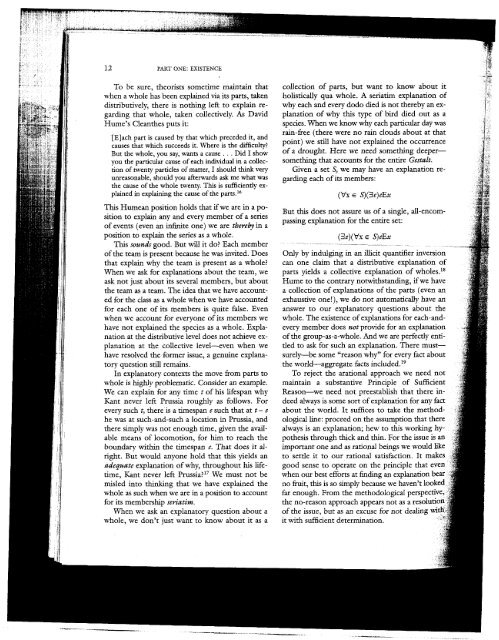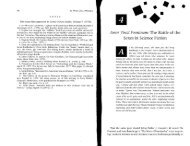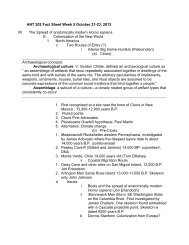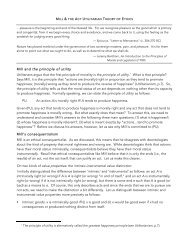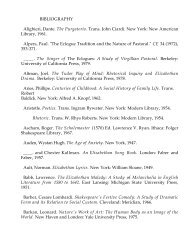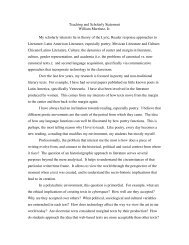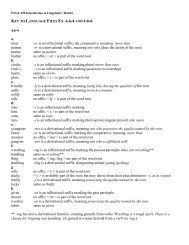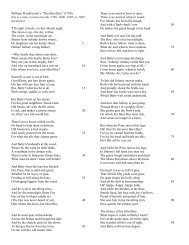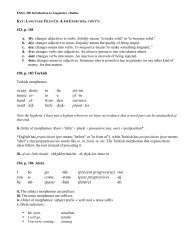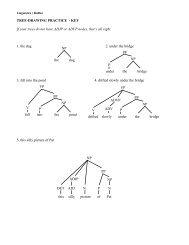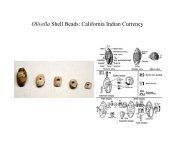On Explaining Existence (Real Possibility as the Key to Actuality)
On Explaining Existence (Real Possibility as the Key to Actuality)
On Explaining Existence (Real Possibility as the Key to Actuality)
You also want an ePaper? Increase the reach of your titles
YUMPU automatically turns print PDFs into web optimized ePapers that Google loves.
12 PART ONE: EXISTENCE<br />
To be sure, <strong>the</strong>orists sometime maintain that<br />
when a whole h<strong>as</strong> been explained via its parts, taken<br />
distributively, <strong>the</strong>re is nothing left <strong>to</strong> explain re-<br />
garding that whole, taken collectively. As David<br />
Hume’s Clean<strong>the</strong>s puts it:<br />
[Elach part is caused by that which preceded it, and<br />
causes that which succeeds it. Where is <strong>the</strong> difficulty?<br />
But <strong>the</strong> whole, you say, wants a cause . . . Did I show<br />
you <strong>the</strong> particular cause of each individual in a collec-<br />
tion of twenty particles of matter, I should think very<br />
unre<strong>as</strong>onable, should you afterwards <strong>as</strong>k me what w<strong>as</strong><br />
<strong>the</strong> cause of <strong>the</strong> whole twenty. This is sufficiently ex-<br />
plained in explaining <strong>the</strong> cause of <strong>the</strong> parts.16<br />
This Humean position holds that if we are in a po-<br />
sition <strong>to</strong> explain any and every member of a series<br />
of events (even an d hte one) we are <strong>the</strong>reby in a<br />
position <strong>to</strong> explain <strong>the</strong> series <strong>as</strong> a whole.<br />
This sounds good. But will it do? Each member<br />
of <strong>the</strong> team is present because he w<strong>as</strong> invited. Does<br />
that explain why <strong>the</strong> team is present <strong>as</strong> a whole?<br />
When we <strong>as</strong>k for explanations about <strong>the</strong> team, we<br />
<strong>as</strong>k not just about its several members, but about<br />
<strong>the</strong> team <strong>as</strong> a team. The idea that we have account-<br />
ed for <strong>the</strong> cl<strong>as</strong>s <strong>as</strong> a whole when we have accounted<br />
for each one of its members is quite false. Even<br />
when we account for everyone of its members we<br />
have not explained <strong>the</strong> species <strong>as</strong> a whole. Expla-<br />
nation at <strong>the</strong> distributive level does not achieve ex-<br />
planation at <strong>the</strong> collective level-even when we<br />
have resolved <strong>the</strong> former issue, a genuine explana-<br />
<strong>to</strong>ry question still remains.<br />
In explana<strong>to</strong>ry contexts <strong>the</strong> move from parts <strong>to</strong><br />
whole is highly problematic. Consider an example.<br />
We can explain for any time t of his lifespan why<br />
Kant never left Prussia roughly <strong>as</strong> follows. For<br />
every such t, <strong>the</strong>re is a timespan e such that at t - e<br />
he w<strong>as</strong> at such-and-such a location in Prussia, and<br />
<strong>the</strong>re simply w<strong>as</strong> not enough time, given <strong>the</strong> avail-<br />
able means of locomotion, for him <strong>to</strong> reach <strong>the</strong><br />
boundary within <strong>the</strong> timespan e. That does it al-<br />
right. But would anyone hold that this yields an<br />
adequate explanation of why, throughout his life-<br />
time, Kant never left Prussia?17 We must not be<br />
misled in<strong>to</strong> thinking that we have explained <strong>the</strong><br />
whole <strong>as</strong> such when we are in a position <strong>to</strong> account<br />
for its membership seriatim.<br />
When we <strong>as</strong>k an explana<strong>to</strong>ry question about a<br />
whole, we don’t just want <strong>to</strong> know about it <strong>as</strong> a<br />
collection of parts, but want <strong>to</strong> know about it<br />
holistically qua whole. A seriatim explanation of<br />
why each and every dodo died is not <strong>the</strong>reby an ex-<br />
planation of why this type of bud died out <strong>as</strong> a<br />
species. When we know why each particular day w<strong>as</strong><br />
rain-free (<strong>the</strong>re were no rain clouds about at that<br />
point) we still have not explained <strong>the</strong> occurrence<br />
of a drought. Here we need something deeper-<br />
something that accounts for <strong>the</strong> entire Gestalt.<br />
Given a set S, we may have an explanation re-<br />
garding each of its members:<br />
(b’x E Q(3e)eEx<br />
But this does not <strong>as</strong>sure us of a single, all-encom-<br />
p<strong>as</strong>sing explanation for <strong>the</strong> entire set:<br />
- -- -- -<br />
(3e)(Vx E S)eEx<br />
<strong>On</strong>ly by indulging in an illicit quantifier inversion<br />
can one claim that a distributive explanation of<br />
parts yields a collective explanation of wholes.’*<br />
Hume <strong>to</strong> <strong>the</strong> contrary notwithstanding, ifwe have<br />
a collection of explanations of <strong>the</strong> parts (even an<br />
exhaustive one!), we do not au<strong>to</strong>matically have an<br />
answer <strong>to</strong> our explana<strong>to</strong>ry questions about <strong>the</strong><br />
whole. The existence of explanations for each-andevery<br />
member does not provide for an explanation<br />
of <strong>the</strong> group-<strong>as</strong>-a-whole. And we are perfectly entitled<br />
<strong>to</strong> <strong>as</strong>k for such an explanation. There mustsurely-be<br />
some “re<strong>as</strong>on why” for every fact about<br />
<strong>the</strong> world-aggregate facts in~luded.’~<br />
To reject <strong>the</strong> arational approach we need not<br />
maintain a substantive Principle of Sufficient<br />
Re<strong>as</strong>on-we need not preestablish that <strong>the</strong>re indeed<br />
always is some sort of explanation for any fact<br />
about <strong>the</strong> world. It suffices <strong>to</strong> take <strong>the</strong> methodological<br />
line: proceed on <strong>the</strong> <strong>as</strong>sumption that <strong>the</strong>re<br />
always is an explanation; hew <strong>to</strong> this working hypo<strong>the</strong>sis<br />
through thick and thin. For <strong>the</strong> issue is an<br />
important one and <strong>as</strong> rational beings we would like<br />
<strong>to</strong> settle it <strong>to</strong> our rational satisfaction. It<br />
good sense <strong>to</strong> operate on <strong>the</strong> principle tha<br />
when our best efforts at finding an explanation b<br />
no fiuit, h s is so simply because we have<br />
far enough. From <strong>the</strong> methodological<br />
<strong>the</strong> no-re<strong>as</strong>on approach appears not <strong>as</strong><br />
of <strong>the</strong> issue, but <strong>as</strong> an excuse for not<br />
it with sufficient determination.<br />
~ -


